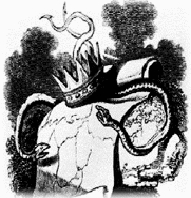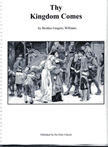Chapter 1. The Kingdom of God

Is Righteousness
“For
the kingdom of God is not meat and drink; but righteousness, and
peace, and joy in the Holy Ghost.” Romans 14:17
The phrase “Kingdom of God”
and the “Kingdom of Heaven” are mentioned over one
hundred times in the New Testament. They are not found in the Old
Testament at all.
Paul tells us that the Kingdom of
God is righteousness. “Righteousness” is translated from the Greek dikaiosune, which is defined, “in a broad sense: state of him who is as he
ought to be… the doctrine concerning the way in which man may
attain a state approved of God … in a narrower sense, justice
or the virtue which gives each his due.”
The idea of God’s dominion does
appear early in that first Testament. Beginning in Genesis, Chapter
1, Verse 26, we see God entrusting Adam with dominion over His
creation and later commanding him to “dress it and keep it.”
This command, “to
dress it and keep it”, is telling us that this man
called Adam is being entrusted with the care of God’s dominion
or kingdom on earth. The second part of the command, “to
keep it”, infers the possibility that man could lose
that dominion, granted by God, to another who desires that power and
right.
The dominion given to Adam was called radah (hdr)
in the Hebrew. It is a root word that does mean “dominion”,
but also “scrape out” or “tread upon”.
There are over fifteen other Hebrew
words found in the Bible that are translated into or defined as
“dominion”. None of them mean exactly the same
thing. English, like most languages, can have several different
definitions for the same word.
“Translators
are traitors”
There are many kingdoms mentioned in
the Old Testament. One of the first was Cain’s city-state named
after his son, Enoch. This institution of iniquity was followed by
others including Nimrod’s civil kingdom of benefits, Sodom’s
city of sin, Pharaoh’s bondage of Israel, and many more.
The whole context of the Bible is
centered around men who serve and walk with God or men who establish
their own governments with a central leader exercising authority over
other men, granted by or taken from the people who become its servant
or subject citizens.
“For
the LORD [is] our judge, the LORD [is] our lawgiver, the LORD [is] our king; he
will save us.” Isaiah 33:22
In the Greek, the Kingdom of God is Basileia means “royal power, kingship, dominion, rule.”
While, Theos, translated
“God” or “gods”, was a common word used to denote a ruling judge or any judge
or magistrate with an exercising authority,
the same is also true for the Hebrew word elohiym, commonly translated “God”
or “gods”. Both terms were used every day
to address magistrates and judges in common courts in nations like
Greece, Rome, and Israel.
When these words are capitalized in
Bible translations, we are to assume that they are referring to the
God of the created universe, or Nature’s God, YaHWeH or
Jehovah. The God of Creation holds ultimate dominion over the
universe and all His creation. His dominion is called the Kingdom of
God. Men often create kingdoms that have gods many who stand
between the God and men.
God’s kingdom could be
considered the vastness of the universe in both a spiritual and
physical sense, but His kingdom on this planet was entrusted to Man.
As long as some men walked with God, instead of bowing to the
gods of this world, God's kingdom will be represented by His
faithful children.
Possession
is, as it were, the position of the foot.
Jesus gives us some insight into the
Kingdom of God in Matthew 20 through 25:
“For
[the kingdom of heaven is] as a man traveling into a far country,
[who] called his own servants, and delivered unto them his goods.”
Mt 25:14
Some men, like Enos, called upon the
name of God and some men like Enoch “walked with God” and
some men strayed and disobeyed God, becoming like gods of men.
Men, like Cain and Lemech, who set up their own dominion to oppress
men, did not call upon God, but seduced men to go under their exercising
authority.
All men sinned, but one man was
“perfect in his generations, Noah walked with God”.
“All
thy works shall praise thee, O LORD; and thy saints shall bless thee.
They shall speak of the glory of thy kingdom, and talk of thy power;
To make known to the sons of men his mighty acts, and the glorious
majesty of his kingdom. Thy kingdom is an everlasting kingdom, and
thy dominion endureth throughout all generations.” Psalms
145:10-15.
These few men and those who followed
their lead were the generations of God’s people on earth. They
were the Kingdom of God on earth. God prevailed in their lives and
they walked in the ways of the LORD God. We see this idea again described by a king of men,
Nebuchadnezzar.
“And
at the end of the days I Nebuchadnezzar lifted up mine eyes unto
heaven, and mine understanding returned unto me, and I blessed the
most High, and I praised and honoured him that liveth for ever, whose
dominion [is] an everlasting dominion, and his kingdom [is] from
generation to generation:” Daniel 4:34:
God’s kingdom was from generation to generation. It was from Adam to Christ. During
the lineal consanguinity of the kingdom, Israel became known as God’s
kingdom on earth. It was not a kingdom or government like what we
commonly see today in most nations, but it was a nation where every
man was prince in his own house. Each family shared in the occupying
of God’s dominion on earth enjoying the milk and honey of that
domestic dominion in pursuit of happiness “under the perfect
law of liberty”. His Kingdom had no king or ruling body, but
only God the Father living within the tabernacle of each man’s
soul and mind. This was Israel, the dominion “Where God
Prevails”.

Order the book
Thy Kingdom Comes
http://www.hisholychurch.org/order/materialskingdom.html










